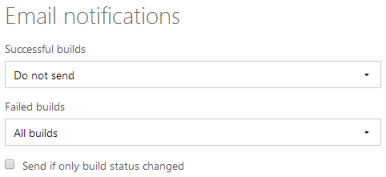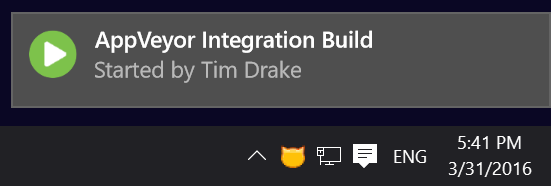Build notifications
- Triggering notifications
- Global email notifications
- Project email notifications
- Slack
- GitHub Pull Request
- HipChat
- Campfire
- VSO Team Rooms
- Webhooks
- Customizing message template
- Adding custom value to notification
- Build status in tray - Catlight
Build notifications are defined on project level and triggered on build success or fail events. You can configure notification on Notifications tab of project settings or in notifications section of appveyor.yml:
notifications:
- provider: <provider_1>
settings: ...
on_build_success: true|false
on_build_failure: true|false
on_build_status_changed: true|false
- provider: <provider_2>
settings: ...
Warning: Notifications defined on project settings UI are merged with notifications defined in appveyor.yml.
Triggering notifications
When notification is configured in appveyor.yml and no on_build_ triggers are specified then all triggers are set to true meaning notification is sent on all three “success”, “failure” and “status change” events. For example, if you have the following setup:
notifications:
- provider: Email
to:
- some@email.com
it will be read by AppVeyor as:
notifications:
- provider: Email
to:
- some@email.com
on_build_success: true
on_build_failure: true
on_build_status_changed: true
so, to not receive notifications on build success specify:
notifications:
- provider: Email
to:
- some@email.com
on_build_success: false
Global email notifications
Email notification preferences sent for all projects are unique for every user and can be changed on Notifications page.
You can limit the amount of email notifications you receive:
- Notifications from all builds
- Only notifications for builds with your commits
- Do not send notifications at all
- Send only if build status has changed

Project email notifications
You can define email notifications specific to a project.
Subject template
If not specified default subject template:
Build {{status}}: {{projectName}} {{buildVersion}}
Message template
Default message body template:
<div style="font-family:'Segoe UI',Arial,Sans-Serif;font-size:10pt;">
{{#passed}}
<h1 style="font-size: 150%;font-weight:normal; color:#078DC7;"><a href="{{buildUrl}}" style="color:#078DC7;">Build {{projectName}} {{buildVersion}} completed</a></h1>{{/passed}}
{{#failed}}
<h1 style="font-size: 150%;font-weight:normal; color:#ff3228;"><a href="{{buildUrl}}" style="color:#ff3228;">Build {{projectName}} {{buildVersion}} failed</a></h1>{{/failed}}
<p style="color: #888;">
Commit <a href="{{commitUrl}}">{{commitId}}</a> by <a href="mailto:{{commitAuthorEmail}}">{{commitAuthor}}</a> on {{commitDate}}:
<br />
<span style="font-size: 110%;color:#222;">{{commitMessage}}</span>
</p>
<p><a href="{{notificationSettingsUrl}}" style="font-size:85%;color:#999;">Configure your notification preferences</a></p>
</div>
How to customize message template
appveyor.yml configuration
notifications:
- provider: Email
to:
- user1@email.com
- user2@email.com
subject: 'Build {{status}}' # optional
message: "{{template_variable_1}}, {{template_variable_2}}, ..." # optional
on_build_success: true|false
on_build_failure: true|false
on_build_status_changed: true|false
Note that you can use template variables for message recipient. For example, this configuration will send email to failed commit author:
notifications:
- provider: Email
to:
- '{{commitAuthorEmail}}'
...
on_build_failure: true
Slack
Slack sends notifications as message attachments which allows differentiating successful/failed builds/deployments with color.

Slack notifications can be configured to use either Authentication token and channel name or Incoming webhook.
Authentication token with channel name
When authentication token is used channel name must be specified. Slack API authentication token can be generated on this page (Authentication section): https://api.slack.com/web
When you specify channel name make sure it starts with # sign if it’s public channel, for example #builds. In appveyor.yml you need to quote channel name to pass YAML validation, for example:
- provider: Slack
auth_token:
secure: AAABBB+CCC==
channel: '#channel'
Incoming webhook
Slack notifications can be configured to use Incoming webhook. When webhook is used channel name can be omitted as it’s encoded into webhook URL.
Follow incoming webhook integration link on Incoming webhooks page to generate new incoming webhook.
In appveyor.yml webhook URL can be set as secure string, for example:
- provider: Slack
incoming_webhook:
secure: AAABBB+CCC+DDD==
Message template
Default Slack message template:
<{{buildUrl}}|Build {{projectName}} {{buildVersion}} {{status}}>
Commit <{{commitUrl}}|{{commitId}}> by {{commitAuthor}} on {{commitDate}}:
_{{commitMessage}}_
appveyor.yml configuration
notifications:
- provider: Slack
auth_token:
secure: kBl9BlxvRMr9liHmnBs14A==
channel: development
template: "{{template_variable_1}}, {{template_variable_2}}, ..."
Encrypt authentication token on “Encrypt configuration data” page in AppVeyor (Account → Encrypt YAML).
GitHub Pull Request
GitHub Pull Request notifications is a perfect way to notify all developers working on a pull request. AppVeyor can post a new comment with build results to a pull request being built. GitHub will send email notifications to all subscribed developers.

A new comment can be made on behalf of AppVeyorBot GitHub account (public repositories only) or any custom GitHub account account (“bot”) having access to your repositories.
Message template
Default GitHub Pull Request comment template:
{{#passed}}:white_check_mark:{{/passed}}{{#failed}}:x:{{/failed}} [Build {{&projectName}} {{buildVersion}} {{status}}]({{buildUrl}}) (commit {{commitUrl}} by @{{&commitAuthorUsername}})
How to customize message template
appveyor.yml configuration
notifications:
- provider: GitHubPullRequest
auth_token:
secure: kBl9BlxvRMr9liHmnBs14A==
template: "{{#passed}}:white_check_ ..."
Encrypt authentication token on “Encrypt configuration data” page in AppVeyor (Account → Encrypt YAML).
HipChat
HipChat has two versions of API: v1 and v2. AppVeyor supports both versions though notifications sent using API v1 allow specifying “from” field:


while API v2 always sends messages on behalf API token issuer:


Authentication token
You can generate API v1 token on this page (you must be a group admin):
https://<your_account>.hipchat.com/admin/api
Notification token type is enough for AppVeyor to post message to a room.
You can generate API v2 token on this page:
https://<your_account>.hipchat.com/account/api
Message template
Default HipChat message template:
<a href=""{{buildUrl}}"">Build {{projectName}} {{buildVersion}} {{status}}</a><br/>
Commit <a href=""{{commitUrl}}"">{{commitId}}</a> by {{commitAuthor}} on {{commitDate}}:
<i>{{commitMessage}}</i>
How to customize message template
appveyor.yml configuration
notifications:
- provider: HipChat
auth_token:
secure: RbOnSMSFKYzxzFRrxM1+XA==
room: ProjectA
template: "{{template_variable_1}}, {{template_variable_2}}, ..."
Encrypt authentication token on “Encrypt configuration data” page in AppVeyor (Account → Encrypt YAML).
Campfire
Authentication token
Campfire API authentication token can be generated on My info page:
https://<your_account>.campfirenow.com/member/edit
Message template
Default Campfire message template:
Build {{projectName}} {{buildVersion}} {{status}}: {{buildUrl}}
Commit #{{commitId}} by {{commitAuthor}} on {{commitDate}}: {{commitMessage}}
How to customize message template
appveyor.yml configuration
notifications:
- provider: Campfire
account: appveyor
auth_token:
secure: RifLRG8Vfyol+sNhj9u2JA==
room: ProjectA
template: "{{template_variable_1}}, {{template_variable_2}}, ..."
Encrypt authentication token on “Encrypt configuration data” page in AppVeyor (Account → Encrypt YAML).
VSO Team Rooms
Authentication
Visual Studio Online team notifications are being sent on someone’s behalf and that user should have alternate credentials enabled for their VSO account. To enabled alternate credentials login to your VSO account and then click your name at the top right corner, then select “My profile” and click “Credentials” tab.
Message template
Default VSO message template
Build {{projectName}} {{buildVersion}} {{status}}: {{buildUrl}}
Commit #{{commitId}} by {{commitAuthor}} on {{commitDate}}: {{commitMessage}}
appveyor.yml configuration
notifications:
- provider: VSOTeamRoom
account: <account-name>
username: <alternate-username>
password: <your-password>
room: ProjectA
template: "{{template_variable_1}}, {{template_variable_2}}, ..."
Webhooks
By default webhook notification makes POST request, but this can be changed to GET with method setting.
Configuring webhooks in appveyor.yml:
notifications:
- provider: Webhook
url: http://www.myhook1.com
method: GET
- provider: Webhook
url: http://www.myhook2.com
headers:
User-Agent: myapp 1.0
Authorization:
secure: GhD+5xhLz/tkYY6AO3fcfQ==
on_build_success: false
on_build_failure: true
on_build_status_changed: true
You can use Mustache variables (explained in the section below) in URL and header values, for example:
- provider: Webhook
url: http://requestb.in/test?appveyor_build_version={{buildVersion}}&appveyor_commit_id={{commitId}}
method: GET
headers:
APPVEYOR-PROJECT-NAME: '{{projectName}}'
APPVEYOR-BUILD-VERSION: '{{buildVersion}}'
APPVEYOR-COMMIT-ID: '{{commitId}}'
Webhook payload (default)
When webhook notification triggers AppVeyor makes POST request to the webhook URL and passes JSON data in the body:
{
"eventName":"build_success",
"eventData":{
"passed":true,
"failed":false,
"status":"Success",
"started":"2014-04-14 7:57 PM",
"finished":"2014-04-14 7:58 PM",
"duration":"00:01:30.3741236",
"projectId":12064,
"projectName":"test-web",
"buildId":14636,
"buildNumber":26,
"buildVersion":"1.0.26",
"repositoryProvider":"gitHub",
"repositoryScm":"git",
"repositoryName":"JohnSmith/test-web",
"branch":"master",
"commitId":"ad2366f0c4",
"commitAuthor":"John Smith",
"commitAuthorEmail":"john@smith.com",
"commitDate":"2014-04-14 1:54 AM",
"commitMessage":"Some changes to appveyor.yml",
"commitMessageExtended":"The rest of the commit message after the first line",
"committerName":"John Smith",
"committerEmail":"john@smith.com",
"isPullRequest":true,
"pullRequestId":1,
"buildUrl":"https://ci.appveyor.com/project/JohnSmith/test-web/build/1.0.26",
"notificationSettingsUrl":"https://ci.appveyor.com/notifications",
"messages":[],
"jobs":[
{
"id":"es941edratul5jm3",
"name":"",
"passed":true,
"failed":false,
"status":"Success",
"started":"2014-04-14 7:57 PM",
"finished":"2014-04-14 7:58 PM",
"duration":"00:01:27.9060155",
"messages":[
],
"compilationMessages":[
{
"category":"warning",
"message":"Found conflicts between different versions of the same dependent assembly....",
"details":"MSB3247",
"fileName":"..\\..\\Program%20Files%20(x86)\\MSBuild\\12.0\\bin\\Microsoft.Common.CurrentVersion.targets",
"line":1635,
"column":5,
"projectName":"MyWebApp",
"projectFileName":"MyWebApp\\MyWebApp.csproj",
"created":"2014-04-14T19:57:54.0838622+00:00"
}
],
"artifacts":[
{
"permalink": "https://ci.appveyor.com/api/buildjobs/es941edratul5jm3/artifacts/MyWebApp.zip",
"fileName":"MyWebApp.zip",
"name":"MyWebApp",
"type":"WebDeployPackage",
"size":3491576,
"url":"https://ci.appveyor.com/api/buildjobs/es941edratul5jm3/artifacts/token/261761baaaa8337f0a13fa8b5587451ff2d13e4cff095c74e6eabb5d5dea0909/MyWebApp.zip"
}
]
}
]
}
}
eventName can be either build_success or build_failure
Webhook payload (custom)
Webhook request body can be customized for cases like notifying New Relic.
Configuring custom webhook request body with default content type (application/json) in appveyor.yml:
notifications:
- provider: Webhook
url: http://requestb.in/p7cjenp7
method: POST
headers:
X-Api-Key:
secure: 9vNz+tHM2nuER4MTf+iIbg==
body: >-
{
"foo": "bar"
}
You can set custom Content-Type header for non-JSON content in appveyor.yml:
notifications:
- provider: Webhook
url: http://requestb.in/1hnkf4y1
method: POST
content_type: application/xml
body: >-
<?xml version="1.0" encoding="UTF-8"?>
<Objects>
<Object Type="System.Collections.Hashtable">
<Property Name="Key" Type="System.String">foo</Property>
<Property Name="Value" Type="System.String">bar</Property>
</Object>
</Objects>
Customizing message template
Message template is a Mustache template with the same data as eventData field in webhook JSON payload above, for example:
{{#passed}} Build {{projectName}} {{buildVersion}} passed {{/passed}}
{{#failed}} Build {{projectName}} {{buildVersion}} failed {{/failed}}
Please note that for Deployment environment notifications, you have to prefix variables with build, e.g. build.commitAuthor.
Adding custom value to notification
Sometimes eventdata from webhook JSON payload is not enough and you need to pass some custom value into notification. One possible trick to do this is to alter build job message.
For example, you need to add some custom warning which appears because of some special condition. Let’s say you want to send specific message in email notification if variable a is greater than b. In this case you can add the following into your appveyor.yml:
test_script:
- ps: if ($a -gt $b) {Add-AppveyorMessage "My custom warning"}
And add the following to notification template:
<p>Build messages:</p>
<ul>
{{#jobs}}
{{#messages}}
<li>{{message}}</li>
{{/messages}}
{{/jobs}}
</ul>
Build status in tray - Catlight
Catlight is an application that runs on Windows and OS X. It shows current status of AppVeyor builds in tray (or menu bar on OS X). In addition, it will show a toaster notification when a build starts or completes. Usage requires a monthly subscription, except for open source projects.
